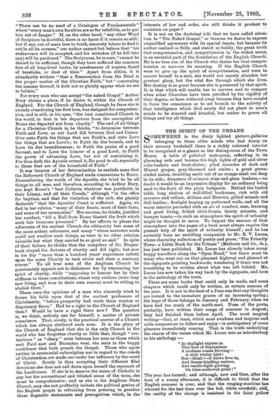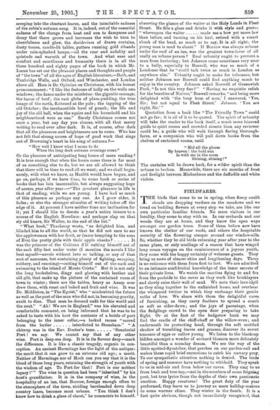certainly been no unwilling companion to Mr. E. V. Lucas,
whose charming collection of poetry and prose, "The Friendly Town : a Little Book for the Urbane" (Methuen and Co., 5s.), has just been published. Mr. Lucas has already taken many happy travellers along the "Open Road," but there must be many who went out on that pleasant highway and glanced at the signposts pointing backwards, wondering if there was not something to be written about what was left behind. Mr, Lucas has now taken his way back by the signposts, and here is the anthology of the town.
There are some books that could only be made, and some chapters which could only be written, at certain seasons of the year. It is not in the heat of a June sun that any thoughts are turned to the immature graces of an incoming spring ; the hope of those belongs to January and February, when we have had too much of the north-east. None of the poets, probably, have written their songs of summer in August; they had finished them before April, The most magical writing—that, at least, which most awakens and inspires and calls companions to follow and enjoy—is anticipatory of some pleasure immediately coming. That is the truth underlying the charm of the verses which Mr. Lucas sets as introductory to his anthology :—
"As daylight expires in This best of Septembers A coolness comes blowing—
A chill wintry hint !
But—think !—it blows fires in, And dream-kindling embers, And candle-light glowing On time-mellowed print !"
The year has turned; and although, now and then, after the heat of a sunny afternoon, it is difficult to think that the English summer is over, and that the reaping-machine has
whirred for the last time over the hot, white cornfield; still, the reality of the change is insistent in the faint yellow
creeping into the chestnut leaves, and the inimitable sadness of the robin's autumn song. It is, indeed, out of the essential sadness of the change from heat and sun to dampness and decay that there grows and increases the wish to turn to cheerfulness and glow, the dssiclerium of drawn curtains, dusty tomes, candle-lit tables, gutters running gold ribands under rain-splashed lamps,—all the roar and sodality and quietude and warmth of the town. And what ease and comfort and courtliness and humanity there is in all the three hundred and eighty pages of the book in which Mr. Lucas has set out the pleasant places and thoughts and people of "the town" of all the ages of English literature,—Bath, and Tunbridge Wells, and Oxford, and Winchester, and London above all. Here is Dr. Opimian on Christmas, with his honest pronouncement: "I like the festoons of holly on the walls anti windows ; the dance under the mistletoe : the gigantic sausage; the baron of beef; the vast globe of plum-pudding, the true image of the earth, flattened at the pole ; the tapping of the old October; the inexhaustible bowl of punch; the life and joy of the old hall, when the squire and his household and his neighbourhood were as one." Surely Christmas comes not once a year, but any day you choose, with all that merry writing to read over after dark. It is, of course, after dark that all the pleasures and brightnesses are to come. Who has not felt that strong access of hope of good work that sings out of Browning's heart in his song of autumn P-





















































 Previous page
Previous page